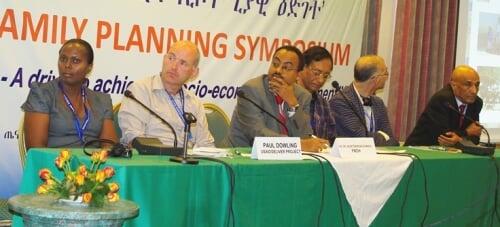29 November, Bahir Dar, Ethiopia — A three-day high level National Family Planning Symposium held in Bahir Dar in Ethiopia concluded with participants calling for action to reach all sections of adolescents and youth with family planning services.
It was highlighted at the meeting from 26-28 November that Ethiopia is going through a demographic transition with declining birth and death rates, creating a unique opportunity for economic development. The country now has more hands to work and the dependency ratio is lowering, it was indicated.
“This is a unique window for Ethiopia to achieve economic growth and prosperity, and secure its place as a middle income country,” said Dr. Sabine Beckmann, Sexual and Reproductive Health (SRH) and HIV/AIDS Programme Coordinator at UNFPA. She added that this, however, requires halving the fertility rates from the current figure of 4.8 and addressing the high level of maternal and child mortality in the country.
It was noted that for Ethiopia to reap the dividend resulting from the demographic transition it is going through, the country needs to promote and strengthen adolescent and youth sexual and reproductive health programmes and allow the allocation of more resources on SRH. However, youth representatives challenged the participants at the symposium, saying that they remain invisible, and called for earnest implementation of youth-related policies and for support to be increased on SRH services, with youth organizations playing an active role.
Though there exists a policy environment conducive for the provision of SRH services in general and family planning in particular for adolescents and youth, the services remain erratic and top-down in design, the symposium heard. It was added that the documentation of good practices on SRH programmes and services for adolescents and youth remains challenging and that the services are typically not organized in a friendly manner. Consequently, the contrceptive prevalence rate among adolescents and youth remains less than the national average.
The symposium underlined that there is a need to adopt an integrated and multi-sectoral approach in addressing adolescent and youth SRH and family planning.
This first-ever National Family Planning Symposium, held under the theme “Family planning – A drive to achieving socio-economic development,” involved more than 500 participants drawn from Members of Parliament, high-level government officials, health service providers, development partners, youth associations and the private sector, among others. The participants deliberated on the experiences of the different regions in Ethiopia in relation to family planning and listened to the experiences of other developing countries.
The London Summit on Family Planning and its implications for Ethiopia was also raised and discussed. The State Minister of Health, Dr. Kesetebrhan Admasu, noted that in the spirit of the pledges made at the London Summit, an additional 10 million mothers in Ethiopia will benefit from family planning services in the coming eight years. He called on all stakeholders to work in an integrated manner to realize this.
Meanwhile, UNFPA, together with the Ministry of Health and other partners, launched a Family Planning Policy Brief and Training Resource Package. The document focuses on a five-point plan that includes making family planning a multi-sectoral issue, financing family planning domestically, expanding youth-friendly services for adolescent girls, as well as scaling-up of hard-to-reach groups, and making contraceptives available by using innovative methods .
UNFPA provided financial and technical support to the symposium, and sponsored scholars to make presentations on some selected topics related to family planning. The ‘Condomize! Don’t Compromise’ campaign was promoted by UNFPA in collaboration with other partners at the exhibition organized at the venue of the symposium, attracting the attention of many participants.
It was announced at the conclusion of the symposium that Ethiopia would be hosting the International Family Planning Conference in November 2013.


